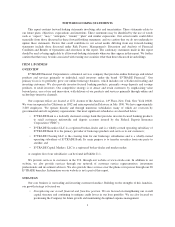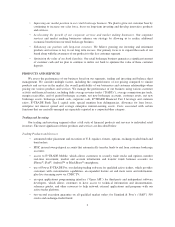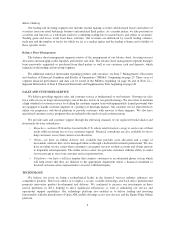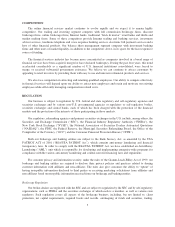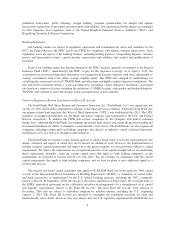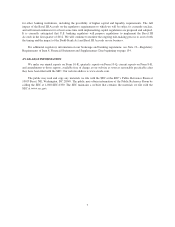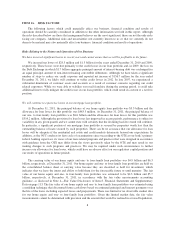eTrade 2011 Annual Report Download - page 14
Download and view the complete annual report
Please find page 14 of the 2011 eTrade annual report below. You can navigate through the pages in the report by either clicking on the pages listed below, or by using the keyword search tool below to find specific information within the annual report.From late 2009 through mid-2011, we requested and received the approval of the OTS, our then primary
bank regulator to permit E*TRADE Bank to pay quarterly dividends to the Company. The dividends approved by
the OTS had been equal to the profits from the previous quarter of E*TRADE Securities LLC. We believe our
former regulator, the OTS, viewed these dividend requests as distinct from a more comprehensive request to
release a portion of E*TRADE Bank’s excess capital. During the third quarter of 2011, we transitioned regulators
from the OTS to the OCC and the Federal Reserve. We believe our new regulators would subject all dividend
requests to an equal level of scrutiny; therefore rather than request a dividend from E*TRADE Bank in an
amount equal to the profits of E*TRADE Securities LLC in the prior quarter, we believe the best path for our
shareholders is to work on a comprehensive dividend plan that efficiently distributes capital among our regulated
entities and parent company. We are in dialogue with our regulators regarding our ability to implement a
comprehensive dividend plan and we expect to complete that dialogue by the end of 2012. Following the
completion of that dialogue, we expect to have a better understanding of the timing of any future dividends;
however, we cannot predict the likelihood or the timing of regulatory approval for any such dividends.
We are subject to investigations and lawsuits as a result of our losses from mortgage loans and asset-backed
securities.
In 2007, we recognized an increased provision expense totaling $640 million and asset losses and
impairments of $2.45 billion, including the sale of our asset-backed securities portfolio to Citadel. As a result,
various plaintiffs filed class actions and derivative lawsuits, which were subsequently consolidated into one class
action and one derivative lawsuit, alleging disclosure violations regarding our home equity, mortgage and
securities portfolios during 2007. In addition, the SEC initiated an informal inquiry into matters related to our
loan and securities portfolios. While we have entered into a memorandum of understanding to settle the
consolidated class action lawsuit, the settlement is subject to Court approval and has not yet been finalized. The
continued defense of these matters and the finalization of the terms of the settlement with the plaintiffs in the
consolidated class action have entailed and will continue to entail considerable cost and may be time consuming
for our management. Unfavorable outcomes in any of these matters, including the consolidated class action if the
settlement is not finalized on the terms anticipated or does not obtain the requisite approval of the Court, could
have a material adverse effect on our business, financial condition, results of operations and cash flows.
Many of our competitors have greater financial, technical, marketing and other resources.
The financial services industry is highly competitive, with multiple industry participants competing for the
same customers. Many of our competitors have longer operating histories and greater resources than we have and
offer a wider range of financial products and services. Other of our competitors offer a more narrow range of
financial products and services and have not been as susceptible to the disruptions in the credit markets that have
impacted our Company, and therefore have not suffered the losses we have. The impact of competitors with
superior name recognition, greater market acceptance, larger customer bases or stronger capital positions could
adversely affect our revenue growth and customer retention. Our competitors may also be able to respond more
quickly to new or changing opportunities and demands and withstand changing market conditions better than we
can. Competitors may conduct extensive promotional activities, offering better terms, lower prices and/or
different products and services or combination of products and services that could attract current E*TRADE
customers and potentially result in price wars within the industry. Some of our competitors may also benefit from
established relationships among themselves or with third parties enhancing their products and services.
Turmoil in the global financial markets could reduce trade volumes and margin borrowing and increase our
dependence on our more active customers who receive lower pricing.
Online investing services to the retail customer, including trading and margin lending, account for a
significant portion of our revenues. Turmoil in the global financial markets could lead to changes in volume and
price levels of securities and futures transactions which may, in turn, result in lower trading volumes and margin
lending. In particular, a decrease in trading activity within our lower activity accounts could impact revenues and
11


